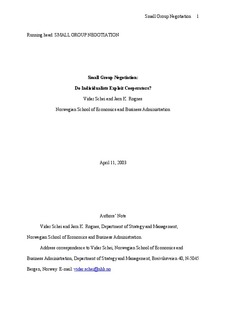| dc.contributor.author | Schei, Vidar | |
| dc.contributor.author | Rognes, Jørn K. | |
| dc.date.accessioned | 2007-06-28T07:53:37Z | |
| dc.date.available | 2007-06-28T07:53:37Z | |
| dc.date.issued | 2003-04 | |
| dc.identifier.issn | 1503-5093 | |
| dc.identifier.uri | http://hdl.handle.net/11250/164284 | |
| dc.description.abstract | Small heterogeneous groups are increasingly used to negotiate important decisions. This
study examines how the differences in motivational orientations impact negotiation outcomes
in three-person groups. We examined the effects on outcomes of varying the number of
members with an individualistic motivational orientation (goal of maximizing own outcome)
and with a cooperative motivational orientation (goal of maximizing both own and joint
outcome). A total of 231 students participated in a negotiation simulation. At the individual
level, negotiators with an individualistic orientation outperformed negotiators with a
cooperative orientation in mixed groups. The criteria that determined satisfaction also differed
depending upon orientation. At the group level, perceived fairness, but not the quality of the
agreement, varied between groups. Members in groups with only cooperatively oriented
members perceived the negotiation to be fairer than did members in other groups. | en |
| dc.language.iso | eng | en |
| dc.publisher | Norwegian School of Economics and Business Administration. Department of Strategy and Management | en |
| dc.relation.ispartofseries | Discussion paper | en |
| dc.relation.ispartofseries | 2003:2 | en |
| dc.subject | negotiation groups | en |
| dc.title | Small group negotiation : do individualists exploit cooperators? | en |
| dc.type | Working paper | en |
| dc.subject.nsi | VDP::Samfunnsvitenskap: 200::Psykologi: 260::Organisasjonspsykologi: 268 | en |
